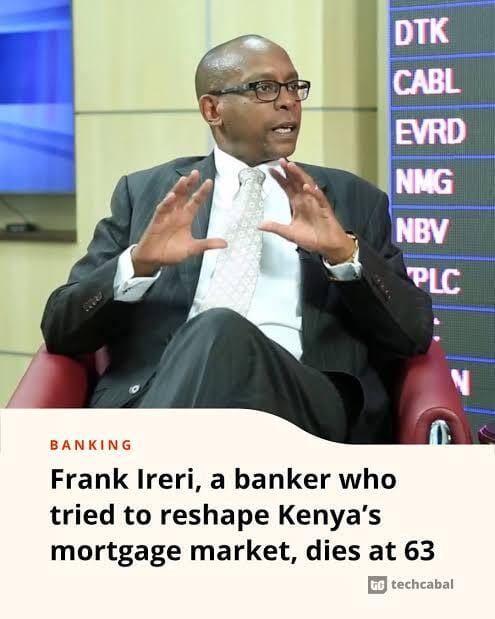On 26 October 2025, news broke that Frank Ireri, former MD of Housing Finance, had passed away at Nairobi Hospital after a long struggle with cancer.

The news was widely reported across major media outlets. (Image credit: Tech Cabal)
Most Kenyans know Housing Finance the company… very few know the banker behind it.
The man who spent over a decade trying to make home ownership possible for the ordinary Kenyan.
To appreciate his impact, we have to remember that in the early to mid 2000s, it was almost impossible to qualify for a home loan in Kenya .
Few families imagined they could ever afford a mortgage.
The idea belonged to the well-connected, the formally employed, and the urban elite.
And even then, the process itself was full of barriers.
To apply, you needed:
A letter from your employer (preferably a recognized company)
Payslips for 3–6 months
Bank statements
A title deed for land already in your name (if building)
Valuation and architectural plans approved by authorities
That meant informal workers, who make up most of Kenya’s labor force, didn’t stand a chance.
Even for those who qualified, interest rates were punishing, hovering around 15–20%, sometimes more.
On a KSh 5 million loan, you could easily end up repaying over KSh 12 million across the term.
Many people feared mortgages because one missed payment could lead to repossession.
It didn't help that loan terms were rigid.
Most banks offered short tenures (10–15 years) with large deposits required upfront.
HFCK, as the “housing finance specialist,” was still conservative, preferring big, salaried borrowers and government employees.
Construction financing was even tougher.
If you wanted to build, not buy, you needed to complete stages before each payment was released.
Delays in approvals often left people stranded mid-project.
Cultural perceptions didn’t help. To many Kenyans, a loan meant danger, not opportunity.
Families feared debt, and banks weren’t seen as partners, they were gatekeepers.
All this to say, when Frank Ireri came in, he was stepping into a system where:
Home ownership was aspirational, not attainable.
Banks were lenders, not enablers.
The system worked for the few, not the many.
A LEGACY INSTITUTION IN NEED OF REINVENTION
By the time he took over in 2006, HFCK was one of the country’s oldest mortgage institutions, but also one of its most stagnant.

Before 2015, it was known as Housing Finance Company of Kenya (HFCK), primarily a mortgage lender focused on residential housing loans.
Its business revolved almost entirely around mortgage lending for a narrow, upper-income customer base.
The broader Kenyan public was effectively locked out of formal housing finance.
After the economic shocks of the 1990s, HFCK was weighed down by non-performing loans that damaged its balance sheet and credibility.
At the time, other banks were evolving and:
expanding into full-service models,
experimenting with technology,
and finding ways to reach new market segments.
HFCK, meanwhile, remained rigid and bureaucratic.
More like a building society than a modern bank.
The mortgage market itself was unstable and easily affected by changes in interest rates.
Regulators and policymakers were calling for reforms that could extend housing finance to middle- and lower-income earners.
But HFCK was not yet built for that future.
When Ireri arrived, the institution needed rescue and reinvention.
His challenge was twofold:
Modernize and stabilize the business model, and
Redefine “housing finance” to include development, construction, and home ownership as a full ecosystem, not just a mortgage product.
A VISION LARGER THAN THE SYSTEM
Ireri’s vision was simple but radical: to make Housing Finance less about lending to a privileged class and more about helping Kenyans actually own homes.

Housing Finance rebranded to HF Group in 2015. ( Image credit: Citizen News)
He led the institution through an era of both transformation, and turbulence.
Under his watch, HF diversified beyond mortgages to remain relevant in a tightening financial landscape.
They ventured into:
HFC Ltd (the banking and mortgage arm)
HF Development & Investment Ltd (property development)
HF Insurance Agency Ltd
He could tell the market was shifting, and people wanted agility, not tradition.
But it wasn’t smooth sailing.
The interest rate cap of 2016 squeezed profit margins.
Defaults rose again as the economy tightened.
Larger commercial banks entered the mortgage space with more resources and reach.
The dream of democratizing home ownership, while noble, grew harder to sustain in a market that still favored short-term returns over long-term social impact.
Still, Ireri’s leadership marked an important moment in Kenya’s financial story.
He understood something many forget; that housing is not just a financial product; it’s a social contract.
Each approved loan was an act of belief: in someone’s future, and in the possibility of security that can’t be taken away by rent or circumstance.
Ireri retired in 2019 after more than a decade of trying to hold together a vision that, perhaps, was larger than the system could support.
On 26 October, news of his passing made the rounds, and with it, a reminder of how quickly we move on from those who tried to make systems more humane.
But maybe that’s what makes his legacy meaningful.
Not that he solved Kenya’s housing crisis, no one person could, but that he tried.
He spent his career translating the dream of a home from a political slogan into a balance sheet reality.
WHAT ENDURES:
Kenya’s housing deficit is still wide, over two million units by most estimates.

In 2019, HF Group CEO Frank Ireri was succeeded by former NIC Bank executive Robert Kibaara. (Image credit: Business Daily)
And the formal mortgage market serves less than 30,000 active borrowers in a country of more than 50 million people.
The math still doesn’t add up.
But when you trace the modern history of housing finance in Kenya, you find Ireri’s fingerprints on the shift from exclusivity to access.
He didn’t fix the system, but he nudged it forward by modernizing an old institution, daring it to think beyond its own walls.
For an emerging economy like Kenya, this matters because progress here is rarely a clean victory.
It’s a relay, passed hand to hand between people who believe the system can work a little better than it does today.
Frank Ireri was one of those people.
A few highlights from his tenure at HF Group include:
1. Modernized Housing Finance:
Transitioned the institution from a pure mortgage lender into a fully fledged banking group (HF Group Plc), diversifying its revenue streams.
2. Expanded Access to Home Ownership:
Championed mortgage affordability and introduced products tailored for Kenya’s emerging middle class.
3. Pushed Digital Transformation:
Oversaw HF’s early adoption of digital banking platforms and mobile-based mortgage services.
4. Strengthened Risk and Governance Systems:
Professionalized internal processes and corporate governance, aligning HF with stricter regulatory standards.
5. Launched HFDI (HF Development & Investment):
Spearheaded property development projects to reduce reliance on interest income and tap into Kenya’s real estate boom.
6. Recognition of Service:
Awarded the national honour of Elder of the Burning Spear (EBS) for his contribution to Kenya’s financial sector.
